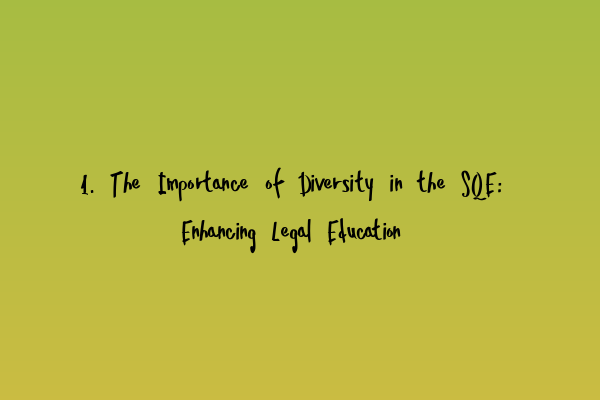**The Importance of Diversity in the SQE: Enhancing Legal Education**
In recent years, diversity has become an increasingly important topic in various industries, including the legal profession. Embracing diversity and promoting inclusivity has become crucial to creating a more equal and fair society. In the legal education sector, the Solicitors Qualifying Examination (SQE) plays a vital role in shaping the future of the legal profession. It is essential to recognize and understand the significance of diversity within the SQE framework and how it can enhance legal education.
Diversity encompasses various aspects, including but not limited to gender, race, ethnicity, disability, sexuality, and socio-economic background. It is essential for the SQE to strive for diversity in all its facets to ensure a well-rounded representation of society within the legal profession.
As a solicitor, I firmly believe that diversity is not just a buzzword; it is a fundamental aspect of legal education. By incorporating diversity into the SQE, we can enrich the learning experience of aspiring solicitors and foster a more inclusive legal community. Here, we will explore why diversity matters in the SQE and how it can enhance legal education.
**1. A Broader Perspective**
One of the fundamental reasons why diversity is crucial in legal education and the SQE is because it provides a broader perspective. Individuals from different backgrounds bring unique viewpoints and experiences to the table. By including diverse perspectives in the examination process, the SQE can ensure a more comprehensive understanding of the law. This inclusive approach allows for a more nuanced and fairer evaluation of candidates’ knowledge and skills.
**2. Reflecting the Real World**
The legal profession serves a diverse range of clients hailing from various backgrounds. It is therefore essential for solicitors to possess an understanding of and sensitivity to different cultures, traditions, and perspectives. By promoting diversity within the SQE, aspiring solicitors can develop the necessary skills to navigate the complexities of a diverse society. This not only benefits individual candidates but also increases the overall effectiveness and inclusivity of the legal profession.
**3. Fostering Equality of Opportunity**
Promoting diversity within the SQE also helps to foster equality of opportunity. By ensuring fair representation and creating an inclusive environment, the SQE can level the playing field for all candidates, regardless of their background. This is particularly important in addressing historical biases that may have prevented certain groups from entering the legal profession. By actively encouraging diversity, the SQE can help to bridge these gaps and create a more diverse and representative legal community.
**4. Enhancing Problem-Solving Skills**
Incorporating diversity into the SQE can also enhance problem-solving skills. By presenting candidates with a diverse range of scenarios and case studies, the examination process can test their ability to navigate complex legal issues within various cultural and social contexts. This, in turn, nurtures critical thinking and problem-solving skills, which are essential for a successful career in law.
**5. Driving Innovation**
Diversity has long been recognized as a driver of innovation. Homogenous groups tend to have limited perspectives and may struggle to come up with creative solutions to complex problems. By promoting diversity within the SQE, fresh and innovative ideas can flourish. This not only benefits aspiring solicitors but also contributes to the legal profession as a whole, fostering growth and progress.
In conclusion, diversity is not just a buzzword; it is a fundamental aspect of legal education that should be embraced within the SQE framework. By incorporating diverse perspectives, the SQE can provide a more comprehensive understanding of the law, reflect the real-world context of the legal profession, foster equality of opportunity, enhance problem-solving skills, and drive innovation.
If you are preparing for the SQE, consider checking out our related articles to help you succeed:
– [SQE 1 Practice Exam Questions](https://fqps.co.uk/sqe/sqe1-preparation/mcq-practice-quiz)
– [SQE 1 Practice Mocks FLK1 FLK2](https://fqps.co.uk/sqe/sqe1-preparation/practice-mocks-quiz)
– [SQE 2 Preparation Courses](https://fqps.co.uk/sqe/sqe2-preparation)
– [SQE 1 Preparation Courses](https://fqps.co.uk/sqe/sqe1-preparation)
– [SRA SQE Exam Dates](https://fqps.co.uk/sqe/sqe1-sqe2-exam-dates)
Remember, embracing diversity is not just a moral duty; it is essential for creating a more inclusive and just society. Let us work towards a legal profession that truly represents the rich tapestry of our diverse world.
